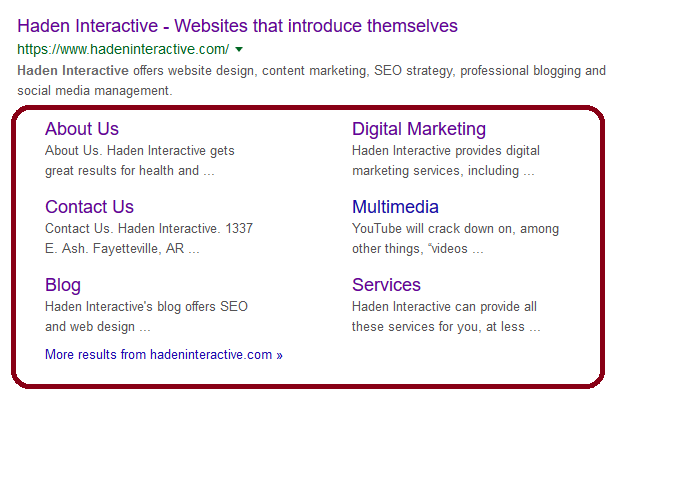Sitelinks. Those additional pages listed below your main listing on the search engine results pages. Google offers them in order to help people find their way around your website.
All in all, they’re a good sign. Some websites don’t have sitelinks at all. And of course every person and every search gets different results, so you and your visitors may see them on some searches and not on others, and they may be different each time.
But they give you extra real estate on the SERPs, with six or more additional pages showing in addition to your main search results. You might even get a special search box.
Here’s what you need to know about sitelinks.
Sitelinks are desirable
As we pointed out above, they give you more results on the same page. They show up primarily when you search for the name of your organization or your website. They won’t show if you’re not the top result for that search, and they won’t show if Google decides that you don’t deserve them.
That means that they show searchers that your website is trustworthy and important.
They can push down negative reviews, news articles, and even your competitors.
They also increase click through rates.
Sitelinks are automatic
You cannot choose your sitelinks in organic results. (It used to be possible to tell Google that you didn’t want a particular page included in the sitelinks, but no longer.)
You can choose your sitelinks for your Google Ads, and you should. But Google analyzes your website and decides whether to show sitelinks in organic results. They also decide what pages to show as sitelinks in any given search.
Some factors that may influence whether you have sitelinks, and which pages are included:
- Your site architecture: the more clear and logical the better
- Page titles and meta descriptions
- Internal links: these help Google determine what’s most important
- Alt tags for images and text for videos
- As always, high quality content is what shows up in SERPs
Google considers the intentions of the searcher in deciding what to show. The more you focus on the intentions and the experience of the people who search for you, the more your results will align with your intentions.


Leave a Reply